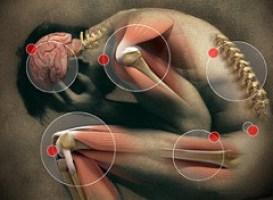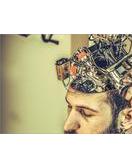Hello Pain, My Old Friend
You might remember from one of our earlier posts, The Neuropathy Chronicles, how we managed to tame the burning foot pain that is so familiar to Superficial Siderosis patients. Two years later TCM is still the winner. We saw for ourselves how true this was during early spring when the electrical system of Gary's heart (more on this later) decided to join the party.
Complications led to pulmonary embolisms in five lobes of his lungs and long-term coagulation therapy. The TCM herbal blend Gary uses stumped the VA pharmacists. He cycled off his neuropathy formula in the hospital while they researched medication conflicts and stayed off them. Jump ahead two months and here comes the tingling. Pretty soon it progressed to full-fledged burning. The VA pharmacy was never able to find any negative information so they let him resume his Corydalis Relaxe™ with the understanding they would be monitoring him closely.
TCM herbal blends work differently than commercial pharmaceutical medications. It takes, on average, two months for your body to reach a therapeutic level. TCM blends are not a quick fix. You can't expect instant relief, but patience pays off. The burning has retreated once again.
Cold Hands Warm Heart
Peripheral neuropathy describes damage to the peripheral nervous system; motor, sensory, or autonomic nerves which move information from the brain and spinal cord to every other part of the body.
Burning foot pain is just a small part of dealing with peripheral neuropathy. The neurodegenerative progression of Superficial Siderosis will touch every one differently depending on your particular nerve damage.
Gary has hit the trifecta. His last neurological exam showed decreased reflexes in his upper body, and he often experiences severe muscle cramps and twitching (motor nerves). The gross motor skills of his hands are classified as severely impaired.
His sensory nerves often cause his hands and feet to feel cold. A pinprick test revealed a diminished sense of pain. He has reduced reflex response in his upper extremities. Gary stubbed his big toe hard enough the toenail stood upright. He didn't feel a thing.
Gary developed what doctors thought was Atrial Ventricular Nodal Reentry Tachycardia (AVNRT). His heart tests show no blockage, minimal valve problems due to aging and other small physical changes. So, the question: was this autonomic nerve damage? He has been on blood pressure medication for years with excellent results. Now his blood pressure bounces from high to low to normal; his blood pressure is all over the place. Eating, either solids or liquids sometimes result in choking. He is now unable to tolerate being outside in the heat of East Texas summers for long.
The neurodegeneration will continue as long as the hemosiderin remains in place.

